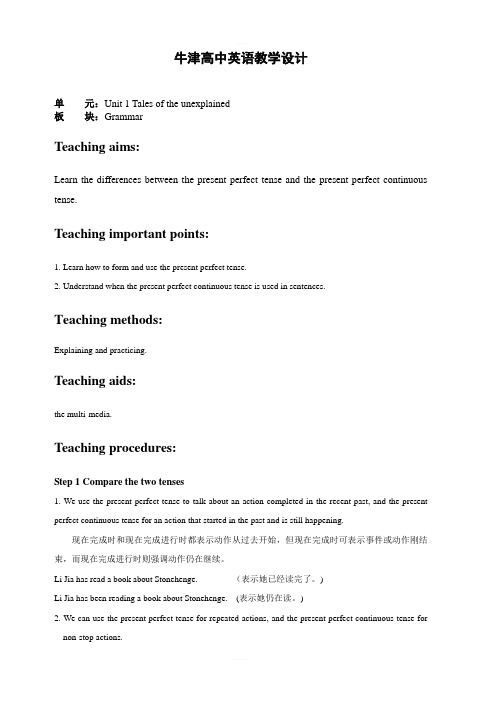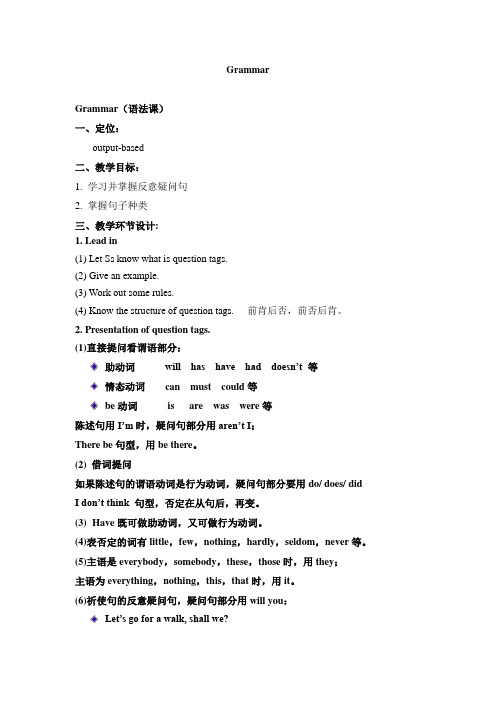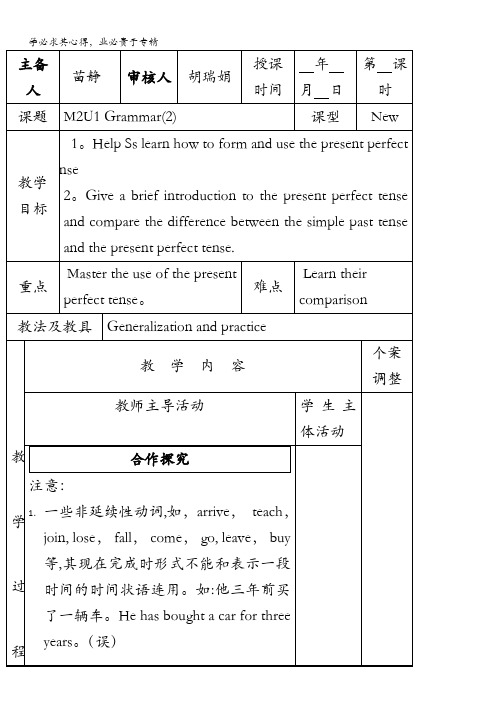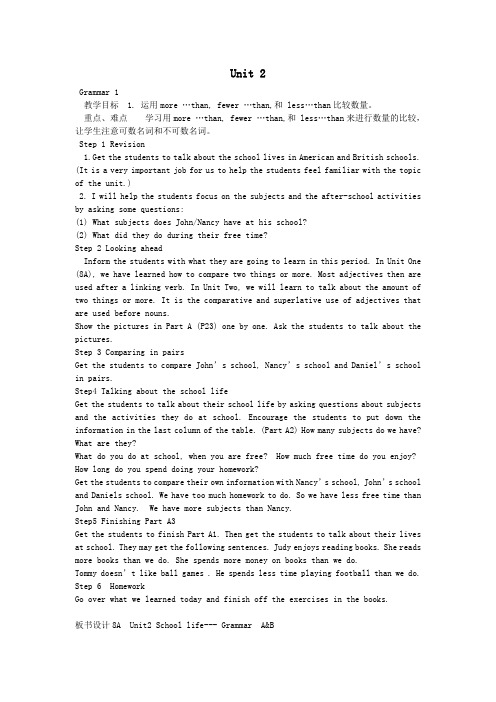牛津版教学设计 M2 U1 Grammar学案设计
- 格式:docx
- 大小:16.83 KB
- 文档页数:3

牛津高中英语教学设计单元:Unit 1 Tales of the unexplained板块:GrammarTeaching aims:Learn the differences between the present perfect tense and the present perfect continuous tense.Teaching important points:1. Learn how to form and use the present perfect tense.2. Understand when the present perfect continuous tense is used in sentences.Teaching methods:Explaining and practicing.Teaching aids:the multi-media.Teaching procedures:Step 1 Compare the two tenses1. We use the present perfect tense to talk about an action completed in the recent past, and the present perfect continuous tense for an action that started in the past and is still happening.现在完成时和现在完成进行时都表示动作从过去开始,但现在完成时可表示事件或动作刚结束,而现在完成进行时则强调动作仍在继续。
Li Jia has read a book about Stonehenge. (表示她已经读完了。
)Li Jia has been reading a book about Stonehenge. (表示她仍在读。
)2. We can use the present perfect tense for repeated actions, and the present perfect continuous tense for non-stop actions.We usually use the present perfect tense to ask questions beginning with how many/much, and the present perfect continuous tense to ask questions beginning with how long.现在完成时可表示反复发生的动作,提问时用how many / how much。


GrammarGrammar(语法课)一、定位:output-based二、教学目标:1. 学习并掌握反意疑问句2. 掌握句子种类三、教学环节设计:1. Lead in(1) Let Ss know what is question tags.(2) Give an example.(3) Work out some rules.(4) Know the structure of question tags.前肯后否,前否后肯。
2. Presentation of question tags.(1)直接提问看谓语部分:助动词will has have had doesn’t 等情态动词can must could等be动词is are was were等陈述句用I’m时,疑问句部分用aren’t I;There be句型,用be there。
(2) 借词提问如果陈述句的谓语动词是行为动词,疑问句部分要用do/ does/ didI don’t think 句型,否定在从句后,再变。
(3)Have既可做助动词,又可做行为动词。
(4)表否定的词有little,few,nothing,hardly,seldom,never等。
(5)主语是everybody,somebody,these,those时,用they;主语为everything,nothing,this,that时,用it。
(6)祈使句的反意疑问句,疑问句部分用will you:Let’s go for a walk, shall we?Let me try again, will you?以Let’s 开头的祈使句,疑问句部分用shall we;以let开头,用will you。
3. Drills.4. Exercises for question tags on p8.Do exercises and check the answers.5. More exercises to consolidate.6. Know the four types of sentences.(1)陈述句(肯定句和否定句)(2)问句(一般疑问句、特殊疑问句、选择疑问句、反意疑问句)(3)祈使句(4)感叹句7.Do some exercises.8. Show some pictures to master the exclamations and remember the structure.1.结构:so + adj./adv.2.结构:such+a/an+adj.+可数名词单数3.结构:How + adj./adv+ 主语+ 谓语4.结构:What+(a/an)+adj.+n.+主语+谓语9. Do some exercises to consolidate.10. HomeworkDo exercises in Book B.。


Unit 2Grammar 1教学目标 1. 运用more …than, fewer …than,和 less…than比较数量。
重点、难点学习用more …than, fewer …than,和 less…than来进行数量的比较,让学生注意可数名词和不可数名词。
Step 1 Revision1.Get the students to talk about the school lives in American and British schools. (It is a very important job for us to help the students feel familiar with the topic of the unit.)2. I will help the students focus on the subjects and the after-school activities by asking some questions:(1) What subjects does John/Nancy have at his school?(2) What did they do during their free time?Step 2 Looking aheadInform the students with what they are going to learn in this period. In Unit One (8A), we have learned how to compare two things or more. Most adjectives then are used after a linking verb. In Unit Two, we will learn to talk about the amount of two things or more. It is the comparative and superlative use of adjectives that are used before nouns.Show the pictures in Part A (P23) one by one. Ask the students to talk about the pictures.Step 3 Comparing in pairsGet the students to compare John’s school, Nancy’s school and Daniel’s school in pairs.Step4 Talking about the school lifeGet the students to talk about their school life by asking questions about subjects and the activities they do at school. Encourage the students to put down the information in the last column of the table. (Part A2) How many subjects do we have? What are they?What do you do at school, when you are free? How much free time do you enjoy? How long do you spend doing your homework?Get the students to compare their own information with Nancy’s school, John’s school and Daniels school. We have too much homework to do. So we have less free time than John and Nancy. We have more subjects than Nancy.Step5 Finishing Part A3Get the students to finish Part A1. Then get the students to talk about their lives at school. They may get the following sentences. Judy enjoys reading books. She reads more books than we do. She spends more money on books than we do.Tommy doesn’t like ball games . He spends less time playing football than we do. Step 6 HomeworkGo over what we learned today and finish off the exercises in the books.板书设计8A Unit2 School life--- Grammar A&B1.Jack has ________ bread _______Leo.2. Peter has ________ bread ________ Jack.3. Peter has __________ bread of all.4. Jack has ___________ bread of all.5. Nancy has _______ apples _______ Millie.6. Amy has _______ apples _______ Millie.7. Nancy has _____________ apples of all.教学反思。

M 2 Unit 1 Tales of the unexplainedGrammar and Usage: Present perfect tense (1)Teaching objectives:(1)We will learn how to form and use Present perfect tense(2)We will grasp some adverbials of time in the present perfect tense(3)We are expected to tell the differences between the present perfect tense and the simple past tenseTeaching methods:Cooperative Learning Approach (group work and pair work)Task-based Grammar TeachingTeaching procedures:Step1: Lead in1.Review: The topic of this unit is about ______________________________.2.Look at some pictures(1)Picture 1: It is about ________.(2) Picture 2: It is about _________.(3) Picture 3: It is about__________.Step2 : Presentation of the present perfect tense1. Summary of the structure of Present perfect tense_________________________________2. Match the following sentences with A,B,C,D (Group work)A: Things that happened in the recent past but are connected with the present.B: Something that started in the past and is still happening now.C: Actions that were completed only a short time agoD:Repeated actions.1)( ) I have watched the American film about Yetis and I know something about it now.2)( ) Some villagers say that they have seen UFOs many times.3)( ) It is reported that Aliens have lived on the earth for thousands of years.4)( ) I have just read an animal novel about Loch Ness Monster.3 Exercise:Fill in the blanks(1)They ____________ (live ) here since their daughter was born.(2)I _______ just ________ (come) back from Nanjing.(3)Nancy ____________ (pass) the exam already.(4)I ______________ (see) the film three times.(5)We ____________ ( know) each other for ten years.(6)Recently, I ___________ (publish) a new novel.(7)--- _________ you ever ________ (sing ) that English song?--- No. I ______ never _______ (sing ) it because it is too difficult for me.Step3 : Usage of some adverbials of time (时间状语)1. Fill in the blanks with “already” and “yet”. (pair work)--- Have they finished the College Entrance Examination ______ ?----No, they haven’t finished it_______ and they are still studying hard.----wish them good luck. They have _________ prepared it for three years. Summary: We use ______in a question(疑问句)or negative sentence(否定句)while use ______ in a statement one(陈述句).2. Fill in the blanks with “ever” or “never”--- Have you _______ been to the Egyptian Pyramids ?--- NO, I have _______ been there.Summary: We use _____ in a question sentence and ______ in a negative sentence.3. Fill in the blanks with “recently”, “lately”, “just.(1)__________, I have been to the Shanghai Disneyland Park.(2)I have ________ been to the Shanghai Disneyland Park.(3)I have been to the Shanghai Disneyland Park,___________.Summary: We put ________ at the beginning or the ending while put _____ between have/has and P.p.4. Fill in the blanks with “for” and “since”.(1) I have lived in the town ______ ten years.(2) I have lived in the town _____ ten years ago.(3) I have lived in the town _______ I worked here.Summary: We use _____ to refer to a period of time (一段时间)while since to refer to a point of time or an action happening in the past.(过去的某一时间点或过去发生的事情)5. Conclusion:We use these time expressions when the exact time of an action is not clear. (it is not a definite 确定的one, we use them to express a period of time) 在现在完成时中,当事情或动作发生的时间不确定时,用时间状语来表达一段时间Step4: Present perfect tense Vs simple past tense1.Tell the differences between the two tenses in the following sentences(1) Justin Foster has been away from home for several days.(2) Justin Foster disappeared last Friday.Explanation:In the first sentence, _________________ is a period of time, which is not a definite (确定的)time. But since he disappeared and until now we haven’t seen him, so we use the present perfect tense.In the second sentence, ________ is a definite time in the past,so we use the simple past tense.(3)He helped the old couple with the housework last weekend and he has visited them three times this month.Explanation: ____________ is a definite time in the past, so we use the simple past tense while ______________________ is a repeated action, so we use the present perfect tense.2.ExerciseProof-reading(For a wrong tense, circle it out 圈出and write the correct one in the blank provided )(1) They have bought this house five years ago and they have lived there since then. ________(2) Although we studied English since five years ago, we still have a long way to study it well._________(3) He just come back from Beijng and visited the Great Wall there. __________(4) The boy has left home three days ago and he hasn’t turn up yet._________(5) She went to see the film again last week. She watched it three times this month. _________.3.ConsolidationFill in the blanks on P8He (1) ______________( just be) to Qomolangma Base Camp and(2)________(see) a Yeti there. He is still very excited about it. He(3)___________(visit)the Great Pyramid in Egypt too. He says that he (4) _________ (love) Egypt but he (5) ___________ (not visit) all the pyramids yet.He (6) _________(see) many crop circles in many places. Though he(7)___________(never meet)any aliens, he believes they do exist. He(8)_______________(travel) to the Indian Ocean many times looking for treasure. Although he (9) __________ (find) many sunken ships, he (10) ___________(not find) any treasure yet.(11)__________he _________ (be) to the Great Wall before? I’m not sure---but I have!Step5: Summary of the wholeStep6: Homework1. Review present perfect tense and simple past tense2. Preview perfect continuous tense。
Module 2 Unit 1 Tales of the Unexplained实习老师:聂姗指导老师:刘超老师Time of Lesson: 90 minutesStudents: C1110Lesson Type: Grammar and usageTeaching aims:Learn the grammar Present perfect tense and Present perfect continuous tense. Teaching important points:(1) Learn how to form and use the present perfect tense.(2) Understand when the present perfect continuous tense is used in sentences. Teaching methods: Explaining and practicing.Teaching aids:The multi-media.Teaching procedures:Step 1: Lead- in(1) Review the simple past tense(2) Lead into the present perfect tense and its usageStep 2: Present perfect tense(1) The form of the present perfect tense: has/ have done.(2) Talk about the uses of the present perfect tense.①We use the present perfect tense to talk about things that happened in the recent past, but are connected to the present. 表示过去发生的事对现在仍有影响。
现在完成时与现在完成进行时学案(仲小艳)Learning aims:1.special usage of the present perfect tense and the present perfectcontinuous tense.2.differences between the past tense and the present perfect tense3.differences between the present perfect tense and the presentperfect continuous tenseLearning importance and difficulty:1.differences between the present perfect tense and the presentperfect continuous tense2.how to identify the two tensesLearning procedures:Step 1.现在完成时:构成:“助动词have/ has + 过去分词”定义:表示发生在过去的动作到目前为止已经完成或对现在有影响。
现在完成时的基本用法:1.表示_________________________常见的时间状语有just, lately, recently, already(肯定句), yet(否定句和疑问句)2. 表示__________________________常用时间状语:for+时间段,since+时间点,in the last few years, so far, by now, this week/month/ year3. 表示__________________________常与always, often, ever, never, twice, how many times等连用。
4. 在时间或条件状语从句中,现在完成时可以__________________________________ Practice:1. 我一写完这封信就寄出去。
I shall post the letter as soon as I _______________ (finish) it.2. 直到车停稳后才能下车。
Don’t get off the bus until it _______________ (stop).3.若非亲眼所见,他绝不会相信任何事。
He will not believe in anything unless he _____________ it with his own eyes.4.如果你做完这个实验,你对这个理论认识得会更深刻。
__________________________________, you will realize the theory in depth.Step 2.the past tense VS the present perfect tense:①the past tense:表示过去发生的动作或情况。
过去如此,现在并非如此。
①the present perfect tense:表示从过去开始持续到现在的动作或情况,常与一段时间连用,对现在有影响。
1. The reporters ________ (go) missing in 2012 and nobody ___________ (see) them since.2. I _______________ (study) in Jiangyin No.1 Senior High School for nearly three years.3. On March 22, 2013, Peng Liyuan ________ (pay) a visit to Russia with her husband, since when the relationship between the two countries ______________________ (improve).4. -- How beautiful the library is, Betty!--Yes. I ______ here for four years when I was at university.A. have studiedB. studiedC. will studyD. had studied5. — Haven't seen you for ages! Where have you been?— I went to Ningxia and ________ (stay) there for one year, teaching as a volunteer.A. have stayedB. stayedC. will stayD. had stayed6. —Oh no! We’re too late. The train ____ .—That’s OK. We’ll catch the next train to London.A. was leavingB. had leftC. has leftD. has been leaving7. I ____ in London for many years, but I’ve never regretted my final decision to move back to China.A. livedB. was livingC. have livedD. had lived8. We won’t start the work until all the preparations _____.A. are being madeB. will be madeC. have been madeD. had been made9. — When shall we restart our business?— Not until we _____ our plan.A. will finishB. are finishingC. are to finishD. have finishedStep 3.现在完成进行时:构成:“助动词have/ has+ been + doing”定义:表示从过去开始一直延续到现在的动作,可能刚刚停止,也可能还将继续下去。
用法:现在完成进行时多用延续性动词,常和_______________________________________等状语以及since, for 引导的时间状语从句连用。
1. --- We’ve spent too much money recently.---Well, it isn’t surprising. Our friends and relatives __________ around all the time.A. are comingB. had comeC. were comingD. have been coming2. ----Do you want to become a famous film star?---- That’s what I _________ since I was a little girl.A. dreamed ofB. have dreamed ofC. dream ofD. have been dreaming of3. They _________________________ (repair) the road, so they are extremely tired.They __________________(repair) the road, so we can drive there.4. Experts for Yetis in the Himalayas for years, but they still one.A. have looked; haven’t been findingB. have looked; haven’t been foundC. are looking; haven’t been foundD. have been looking; haven’t foundStep 4. the present perfect tense VS the present perfect continuous tensethe present perfect tense 强调动作________________________________。
the present perfect continuous tense 强调动作____________________________________。
Practice:1. He ____________________________(这些年来他一直在写文章)for our wall-newspaper these years, and he __________________________________(写了约40余篇).2. — How are you planning to travel to Shanghai?—I _________________ (not decide) yet, but I _________________________ (consider) taking a train.Step 5.Consolidation :1. We _________________ (fish) all afternoon, but we ______________ (not catch) any fish yet.2. The woman ________________________ (try) to make up her mind for the last ten minutes. ________ she _________ (not decide) which pair of shoes to buy yet?3. We _______________ (hear) from her only once since she went away. However, I ___________________ (write) to her all the time.4. They __________________(practise) that song for some time now, but they still __________________ (not get) it right.5. —Why, Jack, you look so tired!—Well, I _______ the house and I must finish the work tomorrow.A. have been paintingB. was paintingC. will be paintingD. have painted6. Don’t disturb me. I _______ letters all morning and _________ four so far.A. write; wroteB. am writing; have writtenC. was writing; wroteD. has been writing; have written7. The famous reporter, who is said to have gone back to America last year, _____ in China for almost 20 years.A. livedB. was livingC. has livedD. have been living8. The famous reporter, who is said to go to America next year, _______ in China for almost 20 years.A. livedB. was livingC. has livedD. had lived9. — During the wartime, he ___ a lot about what he saw and heard in the battlefield.— Yes. The collection of the stories has been published and sells well.A. had writtenB. was writingC. had been writingD. wroteStep 6.Homework《伴你学》P13。